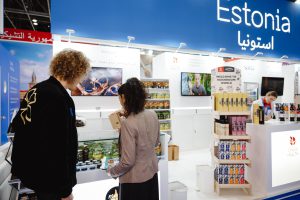DUBAI/ GULF TIME
Estonian ingenuity in food technology is gaining global recognition, particularly in the Gulf Cooperation Council (GCC) region, where the United Arab Emirates (UAE) Ministry of Climate Change and Environment (MOCCAE) has acknowledged the innovative solutions offered by Estonian companies. This acknowledgement culminated in the signing of a memorandum of understanding (MoU) between the MOCCAE and the Ministries of Climate and Regional Affairs and Agriculture of the Republic of Estonia in February this year. The primary objective of this collaboration is to bolster food security and management through the adoption of technology-driven solutions.
The MoU underscores a commitment to fostering sustainable food systems by emphasising waste reduction, the integration of digital solutions in agriculture, and the utilisation of advanced technology to enhance productivity. Joint efforts between the UAE and Estonia encompass research and development initiatives aimed at fortifying food security and facilitating the exchange of technical expertise on trading conditions, restrictions, and procedures.
Situated in Northern Europe, Estonia has emerged as a hub for innovation and entrepreneurship, with its food tech sector being no exception. Local start-ups are leveraging technology to optimise various facets of food production and distribution, from farm to fork.
Estonian innovations in food technology have already made significant inroads in the UAE – most notably through Enterprise Estonia’s ‘Taste of Estonia’ platform, which has enjoyed fruitful collaborations within the Emirates. Estonian companies have showcased at prestigious events such as Gulfood and introduced new culinary experiences, including the establishment of the first Nordic restaurant in Abu Dhabi by Valgerand, following a successful trial period at Expo 2020 and the expansion of the originally Estonian concept Pavlova Cafe across locations including Dubai Mall.
This burgeoning partnership underscores the UAE’s commitment to embracing cutting-edge technologies to efficiently manage resources in alignment with its objectives of strengthening food security and mitigating carbon emissions. Estonian food tech solutions stand poised to facilitate a mutually beneficial exchange of ideas and innovations in bilateral trade.
Considering the environmental impact and the importance of addressing climate change, it is imperative to recognize that food production accounts for a significant portion of global greenhouse gas emissions. Additionally, agriculture places substantial demands on freshwater resources, particularly in arid climates where water scarcity is a pressing concern. In response to these challenges, the UAE government has unveiled a comprehensive action plan to halve food waste by 2030, aligning with global sustainability goals.
Innovation lies at the heart of tackling food waste. It is crucial to explore new technologies that not only minimise waste generation but also valorize byproducts, preferably for human consumption. Collaborative efforts between Estonian researchers and food companies exemplify this approach, as evidenced by initiatives such as TFTAK’s partnership with Estonian apple juice and cider producer Kodas (Siidrikoda OÜ). Through innovative processes, TFTAK has successfully transformed apple pomace, a byproduct of juice production, into a nutritious product with proven health benefits, thereby significantly reducing waste.
Estonian companies continue to revolutionise food production and consumption. ‘Click and Grow,’ for instance, has introduced its Smart Garden system, enabling users to cultivate fresh vegetables year-round with minimal effort. Similarly, ÄIO has developed ground-breaking technology to convert Estonia’s abundant forestry waste into edible fats and oils, offering sustainable solutions for multiple industries.
Forward-thinking countries in the GCC region stand to benefit greatly from embracing innovative solutions to food security and sustainability challenges. By leveraging partnerships with global leaders like Estonia, these nations can pave the way for a more resilient and sustainable future for all.
 The Gulf Time Newspaper One of the finest business newspapers in the UAE brought to you by our professional writers and editors.
The Gulf Time Newspaper One of the finest business newspapers in the UAE brought to you by our professional writers and editors.
